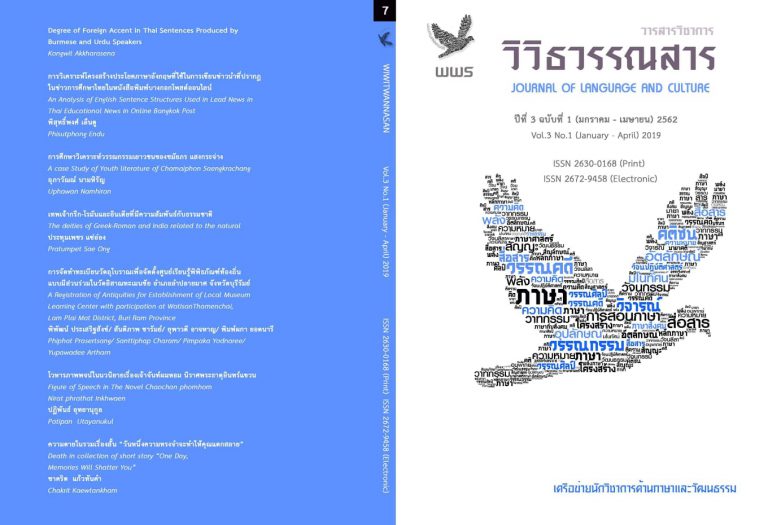ความตาย ในรวมเรื่องสั้น “วันหนึ่งความทรงจำจะทำให้คุณแตกสลาย”
Main Article Content
บทคัดย่อ
บทความนี้มุ่งวิเคราะห์ความตายของตัวละคร ในเรื่องสั้นของ จิดานันท์ เหลือง
เพียรสมุท ตามทัศนะของอาดัม บูเบน เพื่อศึกษาว่า ความตายทางกายภาพของคนและสัตว์
นอกจากความโศกเศร้าสูญเสียที่จะได้รับในเบื้องต้นแล้ว การจากไปของผู้ตายได้ส่งผลกระ
ทบต่อบุคคลรอบข้างหรือผู้ที่ยังมีชีวิตอยู่ให้เรียนรู้ความหมายของการมีชีวิต หรือเกิดการ
ใคร่ครวญและตั้งคำถามเชิงคุณค่าเกี่ยวกับความตาย เพื่อทบทวนเปรียบเทียบหรือนำไปสู่
ความเข้าใจยอมรับ เห็นความสำคัญของความตายได้หรือไม่ ดังนั้น การตั้งคำถามหรือ
ทำความเข้าใจเกี่ยวกับความตายในขณะที่ยังมีชีวิตอยู่ นอกจากจะทำให้เราได้รับคำตอบ
ตระหนักรู้ ไม่ประมาทหรือรู้สึกหวาดกลัวแล้ว แต่จะทำให้เราสามาถรับมือกับความตายที่
จะเกิดขึ้นกับผู้อื่นหรือตนเองในอนาคตได้ดีขึ้น หรือใช้ชีวิตอยู่ร่วมกับสิ่งอื่นหรือผู้อื่นบนความ
ไม่แน่นอนในชีวิตได้อย่างมีสติ
Article Details
ลิขสิทธิ์ของบทความเป็นของวารสาร การพิมพ์ซ้ำจะต้องได้ร้บการอนุญาตจากบรรณาธิการวารสาร
เอกสารอ้างอิง
pai su ik saphawa nueng rawang phuenthi patchuban kap phuen
thi lang khwamtai. (in Thai) [Spatial transition of status between
present moment and afterlife] (Master’s Thesis), Department of
Architecture, Graduate School Silpakorn University, Nakhon Pathom.
Buben, Adam J. (2011). “The Existential Compromise in the History of the
Philosophy of Death”. (Doctoral Dissertation), University of South
Florida. USA.
Dhammajayo (Chuangsamrong), W. (2005). Kan sueksa choeng wikhro reung
khwamtai tam thatsana khong Phutthathat Phikkhu. (in Thai) [A
critical study of the concept of death in BuddhadasaBhikku’s view]
(Master’s Thesis), Graduate School, Mahachulalongkornrajavidyalaya
University, Phra Nakhon Si Ayutthaya.
Kaewtankham, C. (2017). Khondi khonuen lae khonnok kap kan tang
khamtham thueng khwamchuea to sangkhom nai rueangsan
khong Chidanan Lueangphiansamut. (in Thai). [Nice person others
and pariah and questioning the society in short stories by Chidanan
Lueangphiansamut]. Matichon Weekly. 38 (1943): 92.
Lueangphiansamut, C. (2017). Wan nueng khwam songcham cha tham ha
ikun taeksalai. (in Thai) [One Day, Memories Will Shatter You]. Nakorn
Pathom: Porcupinebook.
Uengkhanuengwet, P. (2019). Khunkha chak khwam sinsun: Naewkit rueang
khwamtai khong KhiaKhoekat chak rueang “Longhon” lae “tai
takhaeng” khong Chidanan Lueangphiansamut. (in Thai) [Value
of death: Death concept by Kierkegaad from stories “Longhon” and
“taitakeang” by Chidanan Lueangphiansamut]. Ann-Kit-Khian: Ruam
bot wichan wannakam khong nak rian wannakam lem 3. Bangkok:
Charan Sanitwong Press.
Pattharakhup, Y. (2010). Uppalak khwam tai nai nangsue thamma. (in
Thai) [Death metaphor in drama book] (Master’s Thesis), Faculty of
Arts Chulalongkorn University, Bangkok.
Patthamacharoen, R. (2009). Kan Kha tuatai: Prakotkan thang sangkhom
lae watthanatham. (in Thai) [Suicide: The Social and Cultural
Phenomena]. Journal of Humanities and Social Sciences, 5(2): 7-24.
Royal Institue. (2013). Photchananukrom chbap ratchabandittayasathan
phutthasakkarat 2554. (in Thai) [Royal Institute Dictionary A.D. 2011].
(2nd ed.). Bangkok: Nanmeebooks.
Sunthonpharasathit, N. (2016). Kan namsanoe phap thaen khwamtai nai
rueangsan Thai ruamsamai rawang phoso 2547-2556. (in Thai)
[Representing death in contemporary Thai stories A.D. 2004-2013].
Doctoral Dissertation, Faculty of Arts Chulalongkorn University, Bangkok.
Simmel, G. (2004). The Stranger. In Chirs Jenks (ed.), Urban Culture: Critical
Concepts in Literary and Cultural Studies: London and New York:
Rout ledge.
Tailangkha, I. (2000). Sat lae Sin haeng kanlaorueang. (in Thai) [Sciences and
Art of Short Telling]. Bangkok: Kasetsart University.


